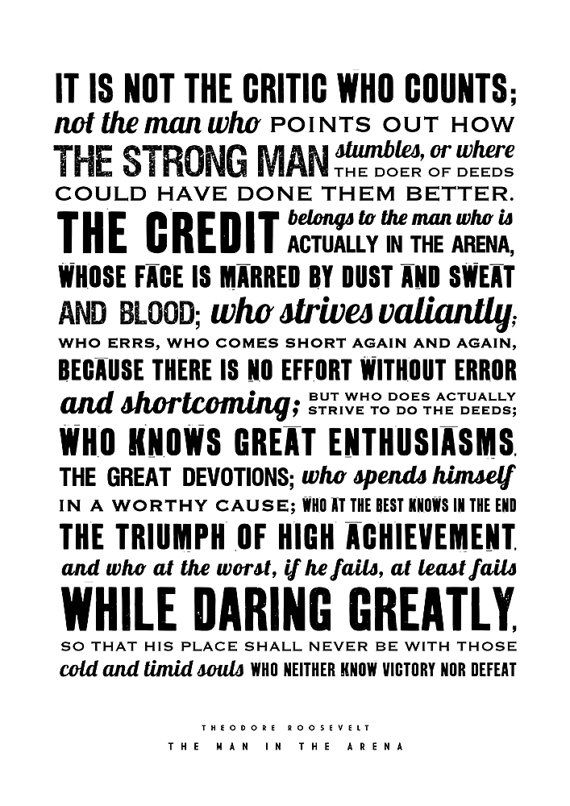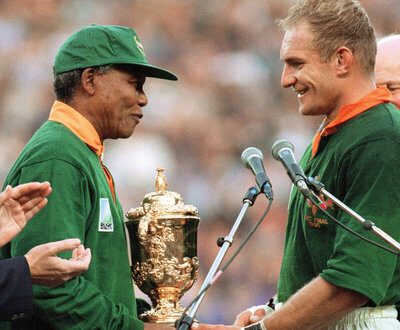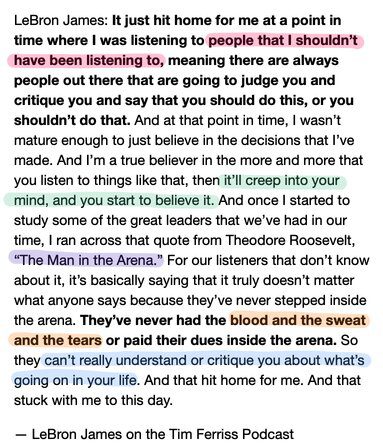It is not the critic who counts; not the man who points out how the strong man stumbles or where the doer of deeds could have done them better. The credit belongs to the man who is actually in the arena, whose face is marred by dust and sweat and blood; who strives valiantly; who errs, who comes short again and again, because there is no effort without error and shortcoming; but who does actually strive to do the deeds; who knows the great enthusiasms, the great devotions; who spends himself in a worthy cause; who at the best knows in the end the triumph of high achievement, and who at the worst, if he fails, at least fails while daring greatly, so that his place shall never be with those cold and timid souls who neither know victory nor defeat.
Former President of the United States, Theodore Roosevelt, delivered the ‘Citizenship in a Republic’ Speech at the Sorbonne in Paris on April 23, 1910. The speech is one of the most quoted Roosevelt speeches, and it is popularly known as “The Man in the Arena.” speech. The man in the arena portion is one of the most quoted and notable section in the speech. The speech was part of a larger trip to Europe that included visits to Vienna, Budapest, and Oslo.
After leaving office in 1909, Roosevelt left New York for the Smithsonian-Roosevelt African Expedition, a safari in east and central Africa. He served as the 26th president of the United States from 1901 to 1909. He remains the youngest person to become President of the United States, he assumed the presidency at age 42.
Man in the Arena Speech
It is not the critic who counts; not the man who points out how the strong man stumbles or where the doer of deeds could have done them better. The credit belongs to the man who is actually in the arena, whose face is marred by dust and sweat and blood; who strives valiantly; who errs, who comes short again and again, because there is no effort without error and shortcoming; but who does actually strive to do the deeds; who knows the great enthusiasms, the great devotions; who spends himself in a worthy cause; who at the best knows in the end the triumph of high achievement, and who at the worst, if he fails, at least fails while daring greatly, so that his place shall never be with those cold and timid souls who neither know victory nor defeat.

Shame on the man of cultivated taste who permits refinement to develop into a fastidiousness that unfits him for doing the rough work of a workaday world. Among the free peoples who govern themselves there is but a small field of usefulness open for the men of cloistered life who shrink from contact with their fellows. Still less room is there for those who deride or slight what is done by those who actually bear the brunt of the day; nor yet for those others who always profess that they would like to take action, if only the conditions of life were not what they actually are. The man who does nothing cuts the same sordid figure in the pages of history, whether he be cynic, or fop, or voluptuary. There is little use for the being whose tepid soul knows nothing of the great and generous emotion, of the high pride, the stern belief, the lofty enthusiasm, of the men who quell the storm and ride the thunder. Well for these men if they succeed; well also, though not so well, if they fail, given only that they have nobly ventured, and have put forth all their heart and strength. It is war-worn Hotspur, spent with hard fighting, he of the many errors and the valiant end, over whose memory we love to linger, not over the memory of the young lord who “but for the vile guns would have been a soldier.
Man in the Arena in popular Culture
Former president of post-apartheid South Africa Nelson Mandela is said to have given a copy of the Man in the Arena speech to the captain of the South African rugby team, François Pienaar, before the start of the 1995 Rugby World Cup, in which the South African team defeated the All Blacks New Zealand team.

American author Brene Brown got the inspiration for the title of her 2012 book from the speech. In the book, Daring Greatly: How the Courage to Be Vulnerable Transforms the Way We Live, Love, Parent, and Lead, she writes about the speech:
“The first time I read this quote, I thought, This is vulnerability. Everything I’ve learned from over a decade of research on vulnerability has taught me this exact lesson. Vulnerability is not knowing victory or defeat, it’s understanding the necessity of both; it’s engaging. It’s being all in.”
“Vulnerability is not weakness, and the uncertainty, risk, and emotional exposure we face every day are not optional. Our only choice is a question of engagement. Our willingness to own and engage with our vulnerability determines the depth of our courage and the clarity of our purpose; the level to which we protect ourselves from being vulnerable is a measure of our fear and disconnection.
When we spend our lives waiting until we’re perfect or bulletproof before we walk into the arena, we ultimately sacrifice relationships and opportunities that may not be recoverable, we squander our precious time, and we turn our backs on our gifts, those unique contributions that only we can make.
Perfect and bulletproof are seductive, but they don’t exist in the human experience. We must walk into the arena, whatever it may be—a new relationship, an important meeting, our creative process, or a difficult family conversation—with courage and the willingness to engage. Rather than sitting on the sidelines and hurling judgment and advice, we must dare to show up and let ourselves be seen. This is vulnerability. This is daring greatly.
Bene Brown also paraphrased the Man in the Arena speech in her 2012 TED talk speech: Listening to Shame.
Lebron James
LeBron James writes “Man in the Arena” on his shoes before every game. In his 2018 podcast interview with author and podcaster Tim Ferris, Lebron speaks about his love for the Man in the Arena quote:
Tim Ferriss: And it’s, I think, the consistency which is such a focus for a lot of, at least, my listeners when they’re looking at your career. It’s been astonishing to watch over time. And many people want to know about the habits or the reminders, things along these lines. And one of the things I came across – I don’t know if it’s true, you could tell me. But did you at one point have Theodore Roosevelt’s “Man in the Arena” quote in your locker?
LeBron James: I still do.
Tim Ferriss: You still do. Why –
LeBron James: I write it on my shoes every game too.
Tim Ferriss: All right. Why is that important to you?

LeBron James: It just hit home for me at a point in time where I was listening to people that I shouldn’t have been listening to, meaning there are always people out there that are going to judge you and critique you and say that you should do this, or you shouldn’t do that.
And at that point in time, I wasn’t mature enough to just believe in the decisions that I’ve made. And I’m a true believer in the more and more that you listen to things like that, then it’ll creep into your mind, and you start to believe it. And once I started to study some of the great leaders that we’ve had in our time, I ran across that quote from Theodore Roosevelt, “The Man in the Arena.” For our listeners that don’t know about it, it’s basically saying that it truly doesn’t matter what anyone says because they’ve never stepped inside the arena. They’ve never had the blood and the sweat and the tears or paid their dues inside the arena. So they can’t really understand or critique you about what’s going on in your life. And that hit home for me. And that stuck with me to this day.
It’s basically saying that it truly doesn’t matter what anyone says because they’ve never stepped inside the arena. They’ve never had the blood and the sweat and the tears or paid their dues inside the arena. So they can’t really understand or critique you about what’s going on in your life.
The Man in the Arena quote is one of my favorite speeches of all time. As a creative, you need to trust the process, ignore the naysayers, bet on yourself, and continue to execute day in, day out. Like Roosevelt aptly said, “It is not the critic who counts; the credit belongs to the man who is actually in the arena, whose face is marred by dust and sweat and blood.”
All the Best in your quest to get Better. Don’t Settle: Live with Passion.



Comments are closed.